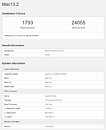TheLostSwede
News Editor
- Joined
- Nov 11, 2004
- Messages
- 17,583 (2.40/day)
- Location
- Sweden
| System Name | Overlord Mk MLI |
|---|---|
| Processor | AMD Ryzen 7 7800X3D |
| Motherboard | Gigabyte X670E Aorus Master |
| Cooling | Noctua NH-D15 SE with offsets |
| Memory | 32GB Team T-Create Expert DDR5 6000 MHz @ CL30-34-34-68 |
| Video Card(s) | Gainward GeForce RTX 4080 Phantom GS |
| Storage | 1TB Solidigm P44 Pro, 2 TB Corsair MP600 Pro, 2TB Kingston KC3000 |
| Display(s) | Acer XV272K LVbmiipruzx 4K@160Hz |
| Case | Fractal Design Torrent Compact |
| Audio Device(s) | Corsair Virtuoso SE |
| Power Supply | be quiet! Pure Power 12 M 850 W |
| Mouse | Logitech G502 Lightspeed |
| Keyboard | Corsair K70 Max |
| Software | Windows 10 Pro |
| Benchmark Scores | https://valid.x86.fr/yfsd9w |
Less than 24 hours after Apple's launch event, the first Geekbench numbers for the new Apple M1 Ultra CPU are out and the numbers are interesting to say the least. For starters, the system the Geekbench numbers are from, is the top of the range 20 Core SKU with 128 GB of RAM. This helps us get some additional insight into Apple's new CPUs. As Apple didn't provide much in technical terms yesterday, nor on its website, we now know that the clock speed of the M1 Ultra is the same 3.2 GHz as the regular M1. It also appears that the CPU cache remains the same, even though Geekbench is only listing the cache of the efficiency cores for some reason.
Although Geekbench isn't a reliable cross-platform benchmark, we do at least get an idea of how the new SoC from Apple performs. The single core performance is more or less on par with the Apple M1 Max, but loses out quite easily to Intel's Alder Lake processors. However, once we move to the multi-threaded test, the M1 Ultra really shows what it's capable of. Surprisingly the performance scaling is almost linear with the double of performance CPU cores compared to the M1 Max, which suggests that Apple's multi-chip module design is extremely capable. The interesting thing will be to see how well this design scales for GPU intensive applications. Stepping outside of the Apple ecosystem, the M1 Ultra ends up somewhere around an AMD Ryzen Threadripper 3970X in terms of multi-core performance. Scaling over some of the detailed tests aren't somewhere between 80-90 percent depending on the particular test compared to the M1 Max, if we compare to the faster results on Geekbench, which is still quite impressive considering we're looking at two M1 Max CPUs that are technically glued together.


View at TechPowerUp Main Site | Source
Although Geekbench isn't a reliable cross-platform benchmark, we do at least get an idea of how the new SoC from Apple performs. The single core performance is more or less on par with the Apple M1 Max, but loses out quite easily to Intel's Alder Lake processors. However, once we move to the multi-threaded test, the M1 Ultra really shows what it's capable of. Surprisingly the performance scaling is almost linear with the double of performance CPU cores compared to the M1 Max, which suggests that Apple's multi-chip module design is extremely capable. The interesting thing will be to see how well this design scales for GPU intensive applications. Stepping outside of the Apple ecosystem, the M1 Ultra ends up somewhere around an AMD Ryzen Threadripper 3970X in terms of multi-core performance. Scaling over some of the detailed tests aren't somewhere between 80-90 percent depending on the particular test compared to the M1 Max, if we compare to the faster results on Geekbench, which is still quite impressive considering we're looking at two M1 Max CPUs that are technically glued together.


View at TechPowerUp Main Site | Source





